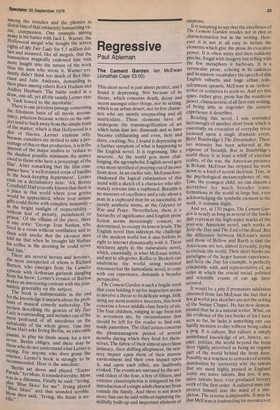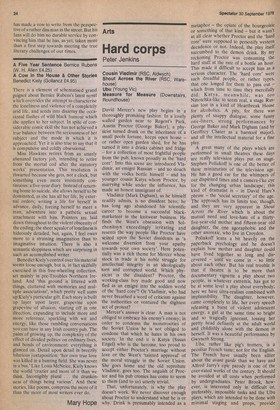Regressive
Paul Ableman
The Cement Garden Ian McEwan (Jonathan Cape £3.50) This short novel is just about perfect, and! found it depressing. Not because of its theme, which concerns death, decay and incest amongst other things, nor its setting, which is an urban desert, nor its few characters who are mostly unappealing and all inarticulate. These elements have all undergone the transmogrification of art which turns dust into diamonds and so have become exhilarating and even, here and there, exalting. No, I found it depressing as a further symptom of what is happening to the English novel. It is regressing, like a neurotic. As the world gets more challenging, the agoraphobic English novel gets ever more terrified of peeping out of its own front door. In an earlier tale, McEwan foreshadowed the logical culmination of this trend with a sketch of a character who ultimately retreats into a cupboard. Breadth is no measure of excellence and a tale about a man in a cupboard may be as successful, in purely aesthetic terms, as the Odyssey or War and Peace. Nevertheless, there is a hierarchy of significance and English prose fiction seems increasingly content, no determined, to occupy its lowest levels. The English novel thus sidesteps the challenge of the modern world but it also forfeits its right to interact dynamically with it. These strictures apply to the naturalistic novel, which, essentially, is what McEwan writes, and not to allegories. Kafica or Beckett can anatomise the world using minimal resources but the naturalistic novel, to cope with our experience, demands a broader perspective. The Cement Garden is such a fragile work that even holding it up for inspection seems to involve a threat to its delicate wings. Still, using my most sensitive tweezers, this book concerns a lower middle-class family of six. The four children, ranging in age from ten to seventeen are, by circumstances that should be left for the reader to find out, made parentless. The chief action concerns the phantasmagoric period of several months during which they fend for themselves. The fabric of their almost speechless intimacy, their shifting allegiances, the sensory impact upon them of their narrow environment and their own impact upon it, and upon each other, are faultlessly evoked. The events are narrated by the sec ond oldest of the four, a boy of fifteen, and extreme claustrophobia is mitigated by the introduction of a single adult character from outside the family. And there is not much more that can be said without rupturing the skilfully built-up and important element of suspense.
It is tempting to say that the excellence of The Cement Cardin resides not in plot or characterisation but in the writing. However it is not at all easy to isolate the elements which give the prose its evocative power. It is often misty and then suddenly precise, frugal with imagery but telling with the few metaphors it harbours. It is a vernacular prose, echoing in its cadences and its narrow vocabulary the speech of dim English suburbs and huge urban redevelopment sprawls. McEwan is an 'artless' writer or contrives to seem so. And yet this spare, rather grey, prose has the wondrous power, characteristic of all first-rate writing, of being able to engender the sensory experience it describes.
Reading this novel, I was reminded increasingly of another short book which is essentially an evocation of everyday trivia focussed upon a single dramatic event, Beryl Bainbridge's The Dressmaker. There too intensity has been achieved at the expense of breadth. But in Bainbridge's world there is at least a whiff of external reality, of the war, the American presence in Britain. McEwan has stripped his work down to a kind of neural skeleton. True, in the psychological metamorphoses of, say, Tom, the youngest child, we can discern a metaphor for much broader transformations in the world at large but, even acknowledging the symbolic element in the work, it remains slight.
And yet, at 130 pages, The Cement Garden is nearly as long as several of the books that represent the high-water marks of the post-war American novel, such works as Seize the Day and The End of the Road. But the difference between McEwan's novel and those of Bellow and Barth is that the Americans are not, almost fervently, trying to exclude the world. Their short books are paradigms of the larger human experience, and Seize the Day for example, is perfectly compatible with, and representative of, an order in which the crucial social, political and scientific events of our age have occured.
It would be a pity if premature adulation obscured from Ian McEwan the fact that a few graceful pen sketches are not the ceiling of the Sistine Chapel. He has now demonstrated that he is a natural writer. What, on the evidence of the two books of his I have seen so far, he lacks is something one can hardly mention to-day without being called a prig. It is culture. But culture is simply assimilated knowledge of art, history, science, politics, the world beyond the front door rightly perceived as being an organic part of the world behind the front door. Possibly as a reaction to centuries of artistic domination by 'university wits' the talents that are most highly praised in England today are naive talents. But few, if any, naive talents have ever produced literary work of the first order. A cultured man can project himself into the mind of a simpleton. The reverse is impossible. It may be that McEwan is husbanding his resources or has made a vow to write from the perspective of a rather dim man in the street. But his fans will do him no durable service by convincing him that he has, as.yet, taken more than a first step towards meeting the true literary challenges of our times.
There is a element of schematised grand guignol about Bernice Rubens's latest novel which overrides the attempt to characterise the loneliness and violence of a completely arid life, and sends into disarray the occasional flashes of wild black humour which she applies to her subject. In spite of considerable comic skill she has not achieved a true balance between the seriousness of her subject and the mode in which it is approached. Yet it is also true to say that it is compulsive and coldly obsessional.
Miss Hawkins retires from an utterly alienated factory job, intending to retire from the mortal coil after the statutory works' presentation. This resolution is thwarted because she gets, not a clock, but something even more insistently continuous: a five-year diary. Instead of returning home to suicide, she allows herself to be dominated, as she has all her life, by external orders; writing a life for herself in advance, daily, forcing herself to meet a man, adventure into a pathetic sexual attachment with him. Pointers are laid down throughout to the violent obscenity of the ending; the sheer squalor of loneliness is hideously detailed, but, again, I feel owes more to a straining imagination than to imaginative intuition. There is also a semantic sloppiness which are surprising in such an accomplished writer.
Benedict Kiely's control over his material seems loose enough, but is, in fact skilfully exercised in this free-wheeling collection, set mainly in pre-Troubles Northern Ireland. And 'this ground is littered with things, cluttered with memories and multiple associations', which pretty well sums up Kiely's particular gift. Each story is built up layer upon layer, grapevine upon grapevine of allusion, starting off in one direction, expanding to include more and more reference, sparkling with wit and energy, like those rambling conversations you can have in any Irish country pub. The pains of growing up, the complexity of the effect of divided politics on ordinary lives, and bonds of environment: everything is. glanced on. Detail upon detail in breezily hilarious juxtaposition: 'her own true love was killed in a hunting field. She was never in a bus.' Like Louis McNeice, Kiely knows the world 'crazier and more of it than we think.. Incorrigibly plural ... the drunkenness of things being various'. And these stories, like poems, compress the more of it than the more of most writers ever do.



































 Previous page
Previous page